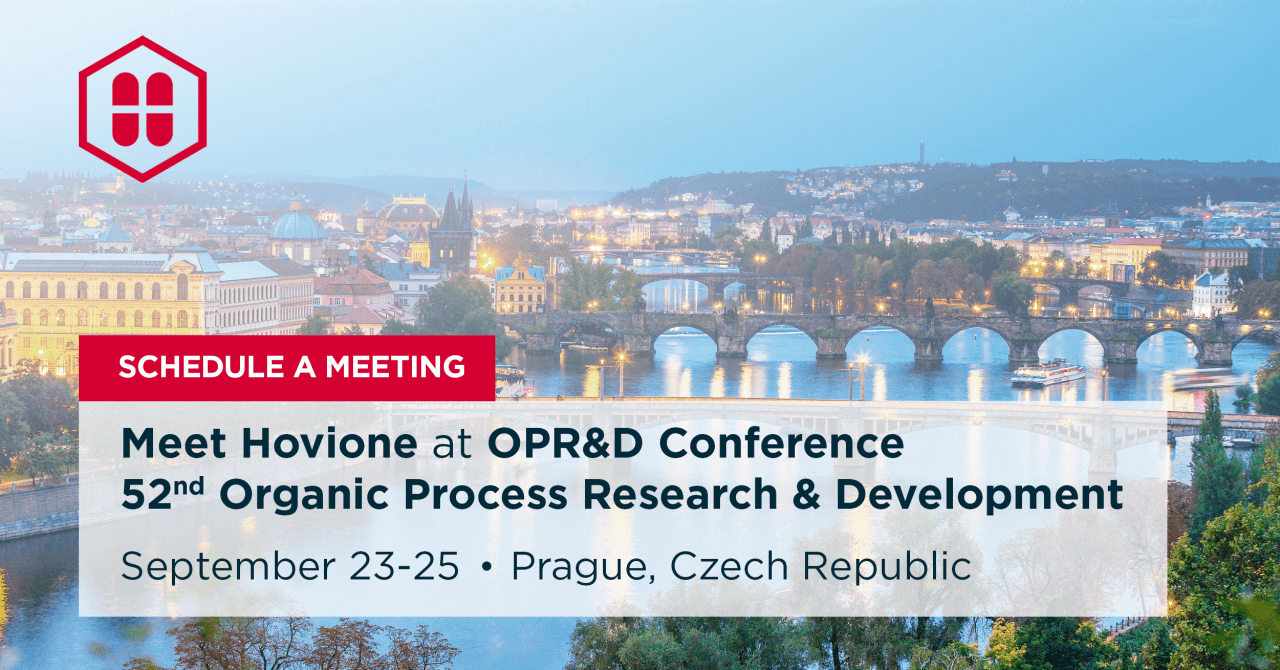Press Room
52nd Organic Process Research and Development (OPR&D)

Visit Hovione at OPR&D, the Leading Process Chemistry Conference from September 23-25 in Prague, Czech Republic.
We are proud to be the Gold Sponsor of the conference, the place to be to learn about the latest scientific updates in the industry and to network with chemical experts from around the globe.

Join the conference's sessions led by our experts
"Women in Process Chemistry"
Chair: Susana Lucas, Ph.D., Sr. Manager, R&D Process Chemistry Development
September 23 from 2:00 PM to 5:00 PM
We are honored to chair and sponsor the Women in Process Chemistry Session at the 52nd OPR&D Conference in Prague. Our expert Susana Lucas will be leading the conversation on innovative approaches to enhance process development efficiency alongside key opinion leaders in the field, including Samantha Staniland from AstraZeneca, Stephanie Kosnik from Boehringer Ingelheim, Dide Verhoeven from Symeres, and Gabriele Menges-Flanagan from Fraunhofer IMM.
Gain valuable insights into sustainable high-throughput experimentation (HTE) techniques in early-stage discovery and learn about cutting-edge crystallization methodologies to overcome isolation challenges. Additionally, learn about the synthesis and process development of an antiviral drug through a multi-kg case study, and delve into the world of organometallics in flow chemistry.
In line with our commitments around diversity, equity and inclusion, we are proud to be part of this initiative that encourages collaboration and innovation in process chemistry.
"Micellar Catalysis: Enabling Sustainable Chemistry in Water"
João Sardinha, Ph.D., Senior Scientist, R&D Process Chemistry Development
September 24 from 11:00 AM to 11:45 AM
Description: Micellar chemistry, often referred to as micellar catalysis, presents a greener alternative to traditional organic solvents. Although water can occasionally replace solvents effectively, its compatibility with organic reagents is not always ideal. Nevertheless, recent developments have led to the introduction of innovative additives, such as aqueous micelles that function as "nanoreactors". These nanospheres, formed by surfactant molecules create a unique environment that enables chemical transformations in aqueous media. This advancement represents a significant step forward in sustainable chemistry, reducing reliance on harmful solvents and promoting environmentally friendly practices in chemical synthesis.
At Hovione, we have been exploring the application of micellar chemistry in various types of reactions, namely amide bond formation, SNAr, Suzuki couplings, nitro reductions, Buchwald-Hartwig amination among others. Several examples and comparison with traditional organic solvent methods will be presented. Additionally, a comparative study of an alkylation reaction in the synthesis of a Hovione API will be showcased, highlighting the superior efficiency, safety, and environmental benefits of micellar chemistry over the existing organic solvent process. The micellar process was successfully developed and optimized by means of Design of Experiments (DoE) ensuring robust and effective conditions. Following successful scale-up, we are about to implement this process at the pilot plant scale.
Schedule your meeting today and find out how we can support your project.
Find more about OPR&D Conference
| You might be interested in: |
|---|
Drug Substance at Hovione
Your partner in custom development and manufacturing of APIs.
Schedule a meeting with our experts to learn more about our custom development and manufacturing of APIs. With worldwide locations, an exemplary regulatory track record and a ‘can do’ approach, our experienced development and manufacturing teams will provide the competence, capacity, safety and quality you expect to manufacture your product on time, on budget and to the very highest standards.
Curious about how combining human expertise with advanced computational models can enhance green chemistry principles in sustainable process chemistry?
Read our article, ‘Benchmarking Strategies of Sustainable Process Chemistry Development: Human-Based, Machine Learning, and Quantum Mechanics’ published in OPR&D Journal here.

